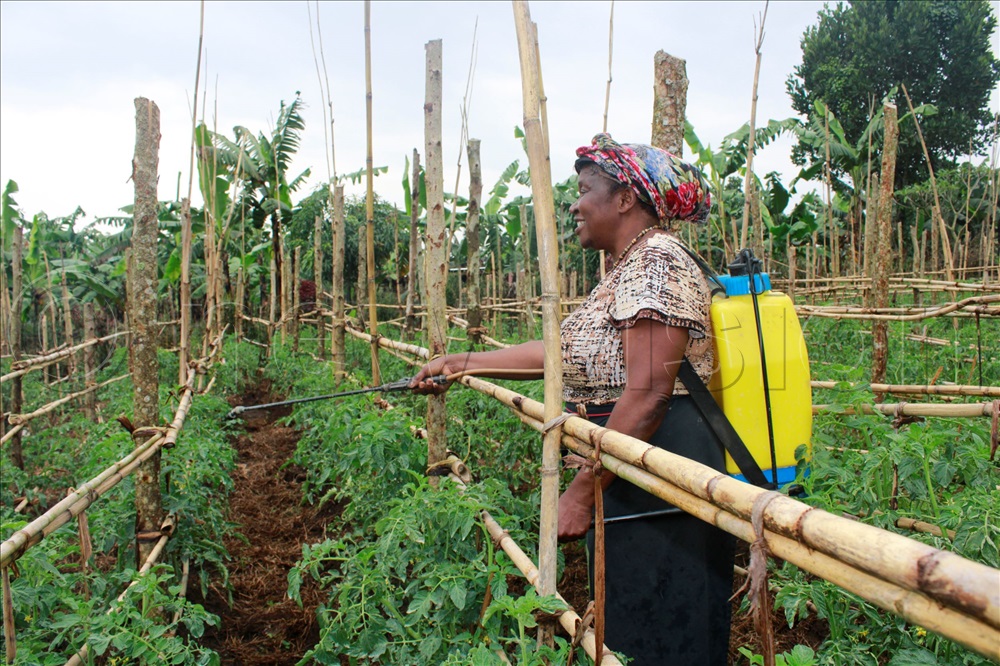By Umar Nsubuga
Commercial tomato farming is a rewarding venture, but it comes with a set of challenges that demand close supervision.
Whether grown in open fields or greenhouses, tomatoes are a high-maintenance crop that requires constant attention to ensure high yields and quality produce.
Precision in planting
Goretti Bagaya, a vegetable farmer and resident of Kitumba A village central division in Fortportal says tomatoes need to be planted at the right time and in the correct manner.

She says proper spacing between plants is crucial to allow for air circulation and sunlight penetration. Without supervision, there’s a risk of overcrowding, which can lead to stunted growth and increased vulnerability to diseases.
Irrigation management
According to Bagaya, tomatoes require consistent and adequate watering, but over- or under-watering can cause significant problems.
“Too much water can lead to root rot, while too little can cause blossom-end rot and poor fruit development. Supervision is essential to monitor irrigation schedules, ensuring the right balance for healthy growth,” she explains.
Pest and disease control
Bagaya says tomato plants are prone to pests like aphids, whiteflies, and caterpillars, as well as diseases such as blight and mildew.
Without proper monitoring, Bagaya says infestations can spread quickly, damaging the entire crop.
“Regular scouting and early detection through good supervision help in timely application of pesticides or organic control methods, preventing extensive damage,” she says.
Nutrient management
Gideon Zakke, an agronomist says tomatoes are heavy feeders, and a lack of nutrients can lead to poor fruiting and weak plants. Good supervision is needed to manage fertilisation schedules, ensuring the plants receive the necessary nutrients at the right growth stages.
He says over-fertilising can lead to excessive foliage at the expense of fruit development, so monitoring is key to balancing the nutrients.
Pruning and training
In commercial tomato farming, especially when growing indeterminate varieties, proper pruning and training are critical. Supervision is needed to ensure that plants are regularly pruned to remove excess leaves and suckers, which can drain energy from fruit production, Zakke says.
Training the plants to grow vertically, using stakes or trellises, also requires constant oversight to prevent the plants from sprawling and getting damaged.
Greenhouse farming
If tomatoes are grown in a greenhouse, Zakke says maintaining the optimal temperature and humidity levels is crucial for their growth.
Supervision ensures that the climate inside the greenhouse is closely regulated, as fluctuations in temperature or humidity can affect fruit setting and quality. Automated systems can assist, but human supervision is essential to respond to any malfunctions or unexpected changes.
Timely harvesting
“Tomatoes need to be harvested at the right stage of ripeness to ensure quality. Early or late harvesting can affect the taste, shelf life, and market value of the tomatoes,” Zakke explains.
Supervising the workers during harvesting ensures that fruits are picked at the optimal time and handled carefully to prevent bruising or damage.
Labour management
Bagaya says a large commercial tomato farm requires many hands to manage day-to-day operations, such as planting, weeding, pruning, and harvesting.
Supervision ensures that workers are performing tasks efficiently and correctly, reducing errors and wastage. It also ensures adherence to safety protocols, protecting both the workers and the crop.





